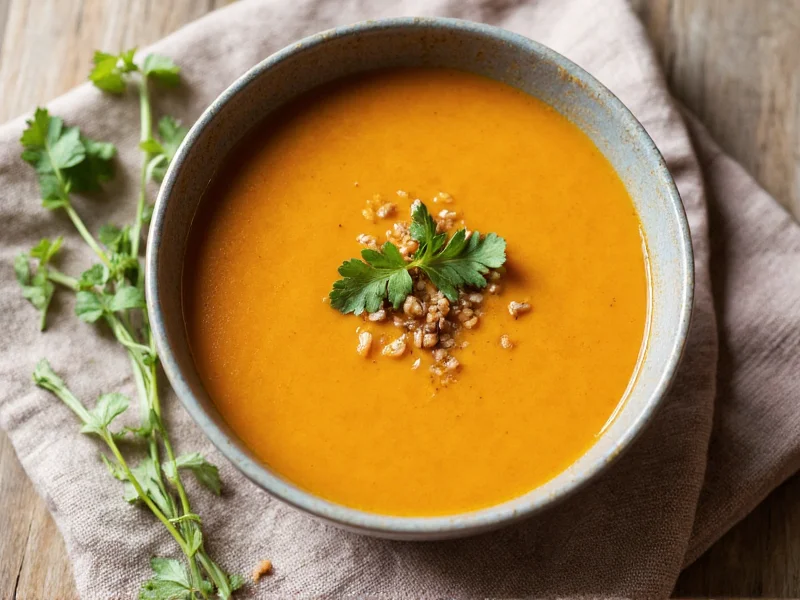When searching for information about does detox soup really work, it's crucial to separate marketing claims from scientific reality. Your body has highly efficient natural detoxification systems: the liver processes potentially harmful substances, while the kidneys filter waste from your blood. No special soup can enhance these biological processes beyond their normal function.
Understanding Detoxification: Science vs. Marketing Claims
The term “detox” has been co-opted by wellness marketing, creating widespread misconceptions about healthy detox soup recipes without fad claims. True detoxification refers to medical procedures for substance abuse treatment—not dietary interventions. Nutrition science consistently shows that the human body doesn't require special “cleanses” to eliminate toxins.
Nutritional Benefits of Vegetable-Based Broths
While detox soups don't perform miraculous cleansing, well-prepared vegetable broths offer genuine nutritional advantages that contribute to natural detox support through nutrition. These benefits include:
| Common Detox Soup Ingredient | Actual Scientific Benefit | Common Misconception |
|---|---|---|
| Leafy greens (kale, spinach) | Rich in vitamins A, C, K and folate; support cellular function | “Removes heavy metals from the body” |
| Lemon juice | Provides vitamin C; may improve iron absorption | “Alkalizes the body and flushes toxins” |
| Ginger | Contains gingerol with anti-inflammatory properties | “Stimulates liver detox enzymes” |
| Garlic | Contains allicin with antioxidant properties | “Chelates toxins from the bloodstream” |
| Broth base (bone or vegetable) | Provides hydration and electrolytes; supports gut lining | “Flushes all toxins from your system” |
Evidence-Based Approach to Cleansing Soups
For those interested in evidence-based cleansing soup recipes, focus on nutrient density rather than detox promises. A scientifically sound approach includes:
- Using organic vegetables to minimize pesticide exposure
- Incorporating a variety of colors for diverse phytonutrients
- Adding healthy fats like avocado or olive oil for nutrient absorption
- Maintaining proper sodium balance with natural ingredients
- Consuming as part of a balanced diet, not as a replacement for meals
Potential Risks of Extreme Detox Diets
Many vegetable broth for digestive health programs promote restrictive eating that can cause harm. Registered dietitians warn that extreme detox regimens may lead to:
- Nutrient deficiencies from limited food variety
- Electrolyte imbalances affecting heart function
- Slowed metabolism from prolonged calorie restriction
- Disordered eating patterns and unhealthy food relationships
- Gastrointestinal distress from sudden dietary changes
Supporting Your Body's Natural Detox Systems
Instead of seeking scientifically backed detox soup benefits that don't exist, focus on evidence-based practices that genuinely support your body's natural detoxification processes:
- Maintain adequate hydration with water and herbal teas
- Eat sufficient dietary fiber from whole plant foods
- Get regular physical activity to support circulation
- Ensure quality sleep for cellular repair processes
- Limit exposure to environmental toxins where possible
- Consume cruciferous vegetables that support liver enzyme function
Creating a Nutrient-Rich Cleansing Broth
For those interested in preparing a genuinely health-supportive broth, consider this evidence-based approach to healthy detox soup recipes without fad claims:
Start with organic vegetable scraps (carrot peels, celery ends, onion skins) simmered in filtered water for 45 minutes. Add fresh ingredients like chopped kale, diced zucchini, and minced ginger during the last 15 minutes. Finish with a squeeze of lemon juice and a drizzle of cold-pressed olive oil. This preparation maximizes nutrient availability while avoiding exaggerated health promises.
When to Consult a Healthcare Professional
Be cautious of any detox soup cleanse programs that promise rapid weight loss or medical benefits. Consult a registered dietitian or physician before starting any restrictive eating plan, especially if you have underlying health conditions. Medical professionals can provide personalized guidance based on your specific health needs rather than generic detox claims.
Conclusion: Realistic Expectations for Cleansing Broths
Nutrient-dense vegetable broths can be a valuable component of a healthy diet, offering hydration, vitamins, and minerals. However, they don't provide special detoxification capabilities beyond supporting general health. The most effective “detox” is maintaining a balanced diet, staying hydrated, getting adequate sleep, and avoiding unnecessary exposure to toxins. Focus on sustainable healthy habits rather than short-term cleansing solutions that lack scientific backing.











 浙公网安备
33010002000092号
浙公网安备
33010002000092号 浙B2-20120091-4
浙B2-20120091-4